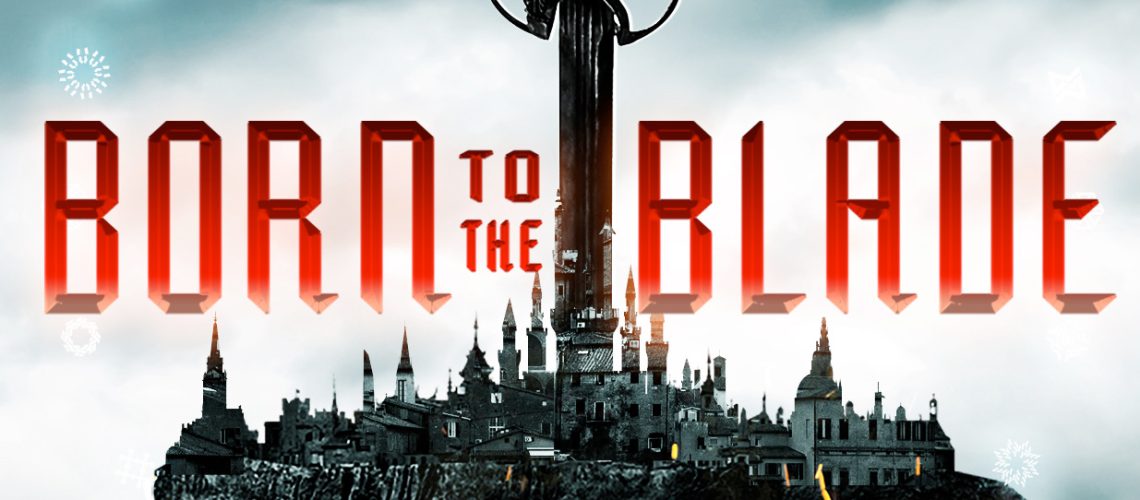Imagine a place where diverse and very different polities come to meet, to trade, to conduct diplomacy, to intrigue. Amidst large and scheming powers in a world on the edge of conflict and war, this is a shining beacon, all alone in the night. Imagine a group of ambassadors who come to meet at this place. They have agendas, factions, goals, hopes, fears that they bring with them from across known space. And what they do will not only change their lives, but the destinies of worlds far beyond theirs.
No, this is not Babylon 5*. For this place is a trio of islands in the sky; the diplomats and ambassadors are skilled with swords and blade-based magic. Welcome to the world of Serial Box’s latest serial, Born to the Blade.

Born to the Blade is the brainchild of Skiffy and Fanty stalwart Mike Underwood. Along with his writing team of Cassandra Khaw, Malka Older and Marie Brennan, Born to the Blade tells the story, primarily, of a trio of new and would-be ambassadors to the island of Twaa-Fei. Twaa-Fei does not have the large landscapes of places like Quloo, Vania, or the grasping Mertikan Empire. It prides itself as a neutral place, a small trio of islands in the sky connected by a sky elevator, who makes its coin by being a locale where all the great powers can meet and make trade deals. Given the intrigues of Mertika, the waning fortunes of Quloo, the attempted rise of Rumika, and the other floating islands interests and agendas, Twaa-Fei is a melting pot and a rich central point to feature the stories therein. While we get a few scenes off of the triple island, the main focus of the serial, like its inspiration Babylon 5, is firmly on this central location. We get to experience the wide variety of cultures and world through the eyes of the inhabitants and visitors.
The setup of the world enthralled me from the start. I have previously talked about books like Joseph Brassey’s Skyfarer, Curtis Craddock’s An Alchemy of Masques and Shadows, and RPGs like Swashbucklers of the Seven Skies. And further back, to AD&D’s Elemental Plane of Air, and Niven’s Integral Trees and The Smoke Ring. The idea of floating islands, in space, in the atmosphere of a gas giant, in a sphere of air around a neutron star is a setting that holds enormous potential and story value. What sense of adventure and wonder is there is flying from place to place, visiting intense locales where one might find anything. It is the fantasy equivalent of sword and planet and planetary romance end of the space opera settings in classic science fiction.
Above and beyond the rich world and worldbuilding, Underwood and his team bring together an intriguing set of point of view characters and secondary characters to populate that rich world. Our main protagonists are three. Michiko is a denizen of Kakute, a proud island that is now part of the Mertikan Empire. Michiko must balance her feelings with her homeland with her duty and responsibility to her Mertikan superiors. Ojo is the representative from Quloo. Quloo used to be a great power in the skies, a swagger and strength that used to terrify and cow their neighbors, but now are not only in faded glory, but in real danger of sinking underneath the obscurity of history. Ojo’s challenge is for him to have to keep the interests of Quloo in front, and keep their weakness obscured. And then there is Kris. Kris is from Rumika, an island in the ascendency, even given the burgeoning power of the Mertikan Empire. Rumika is so new a power, in fact, that they have no voice in the Warder’s Circle council at Twaa-Fei. Kris’ goal, then, is for them to win that seat at the council for Rumika and promote their nation’s interests. Not everyone, you might imagine, is enthused by this idea. As the plot unfolds and events from outside impinge on Twaa-Fei and these representatives and the others on the council, the characters’ strengths, fears, agendas and personalities come together, come in conflict and are all most excellently presented.
The minor characters also work superbly well as a supporting cast to this trio. There is a richness and depth to everyone who comes on the screen, no matter the size and importance of the role. I was particularly taken with Lavinia, the representative of the Mertikan Empire (and thus Michiko’s superior). She is intelligent, formidable, dangerous with sword and spell, and is a force of nature whenever she appears.
The writing team works together fluidly well, The handoffs between the different authors is smooth. There are distinct voices between the various narrators, playing to their strengths. Underwood and Brennan display strong cultural worldbuilding (including the duels!). Older’s episodes feature strong interest in politics. Khaw’s episodes work really well on a character level, delving into character in a deep and intense way.
The Serial Box family is growing a reputation for interesting properties set in diverse worlds, written by strong and suited teams of writers. Born to the Blade, in my view, brings together authors I have enjoyed before into a world that I eat up with a spoon, and a set of characters I am very happy through which to see and explore it. Even with such heavy hitters and favorites like Tremontaine and The Bookburners, Born to the Blade threatens to become my favorite Serial Box serial. I urge you to try the first episode, and find out why.
*We at Skiffy and Fanty have been rewatching (or in the case of Shaun, watching for the First Time, Babylon 5. You can find those podcasts here.







